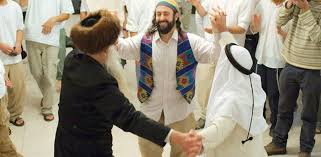WORLDVIEW: Jews and Muslims are closer than they think
By Jonathan Power
The newly appointed prime minister of Israel, Benjamin Netanyahu, makes little pretense of his hatred of Muslim Palestinians. Neither does an overwhelming majority of those who elected him. Yet they never answer the conundrum, how can they expect to live indefinitely cheek-by-jowl with the Palestinians with animus running continuously so near the surface? How do they reconcile their feelings with the Old Testament admonition of Isaiah to “beat their swords into plowshares and spears into pruning hooks. Nation shall not lift up sword against nation, neither shall they learn war anymore.”?
Jews and the Palestinians are closer than they like to think. The fundamental values of Israel are also sacred to Muslims. The word "Israel" is the name of the prophet Jacob who is praised in the Koran and remembered with great respect by Muslims. The Star of David is the holy symbol of the prophet David for Muslims as well as Jews. The prophets Abraham, Isaiah, Joseph, and Moses are as important to Islam as they are to Judaism. And so the litany of joint points of faith can continue for pages.
Is it possible at this late hour for the protagonists of the Israeli/Palestinian dispute to take a step backward and realize how much of history is common to both their faiths? Can they dwell less on the horrors of the present conflict and realize anew that for most of the 1400 hundred years, they have rubbed shoulders on the occasions when there was serious animosity between them was few and far between? It was the Christians who gave both Muslims and Jews their tribulations, not each other.
It was a strange combination of rather naïve Christian sentimentality among British policymakers in the 1910s combined with the murderous racism of Nazism that found its fertile bed in the most cultured corner of European Christendom in the 1930s that were the instruments for the creation of a well-populated Jewish homeland in the middle of an Arab land that had been continuously under Muslim Ottoman rule for seven centuries.
It is the Christians who have created the stage that sets Jew against Muslim in the lethal confrontation of today that has no antecedent in the history of Muslim-Jewish relations.
Now the Muslim-Jewish relationship has its own bitterly charged dynamic. For the first time in Judaeo-Islamic history, there have been full-scale wars. For the first time in their history, they are struggling over the same piece of land. (The ancient Jewish struggle for an independent Jewish territory was waged against the Egyptians and then the Romans, long before Mohammed was born.)
For the first time in their long joint history, there seems to be a visceral hatred that the passing of the years, despite all the negotiations and peace plans, seems to make worse. The Christians- or their secular descendants- sit on the sidelines, wringing their hands, offering every two or three years new peace plans, but it all seems to no avail in a situation where Jew and Palestinian see only a bitter antagonist on the other side.
Power of shame
David Shipler, the former New York Times Pulitzer Prize-winning Middle East correspondent, has written: "It is hard to get a clear view from the wrong end of a gun. So most Palestinians have been unable to see the conscience that runs strongly beneath the surface of Israeli brutality. Palestinian leaders have never understood the power of shame, which Martin Luther King used as leverage against white America.
They have never comprehended how malleable Israel could become to fulfill its yearning for virtue and acceptance. Instead, they have made sure that Israelis don't feel safe, and when you don't feel safe, you don't feel flexible."
And one could add to that modern-day Jewish leaders have belittled Arab culture and Muslim religiosity in a way their forebears would never have thought to do. Although Islam, like Judaism, owes much to its early war-making, Islam has always been the most tolerant of all the monotheistic religions and one with which it has always been possible to strike an honorable bargain. Modern-day Zionism has rarely sought to plumb the depths of Islam's long and deeply held notions of respect for Judaism.
The answer must surely be to persuade Palestinian and Jew to turn back to reflect on their old-time religious identity. It is not a clever plan that can now on its own provide the fix that will bring a peace agreement. It is not a deal negotiated at Camp David or come to that at Taba- although all these remarkable efforts show how close the parties are to peace if they want it badly enough. It is the question of building trust and re-examining the roots of faith on both sides.
Outsiders may despair at the slow pace of positive change and of the setbacks that seem to constantly occur. But deep down we should know that the layers of poison and animosity do not lie as ingrained through generation upon generation as they do in some other societies and other parts of the world. The lamb and the lion can lie down together and could do even sooner if leaders on both sides adopted Martin Luther King's tactics of taking their opponent off balance by clever and subtle use of non-violent action. The long, rather benign, history of Jew and Muslim suggests that then there could still be a breakthrough.
